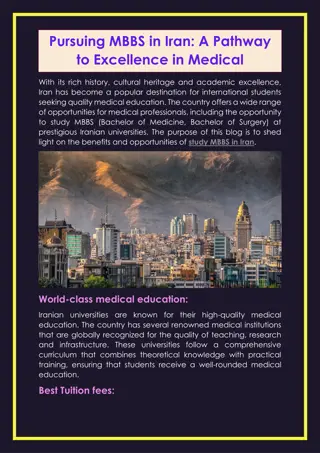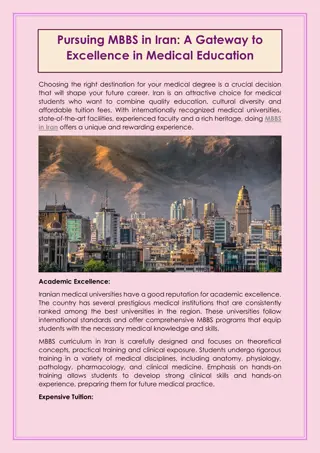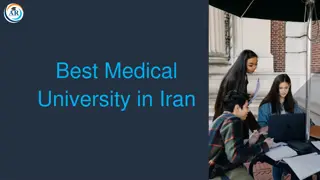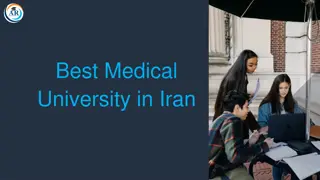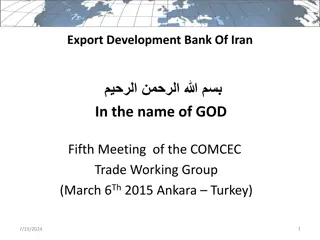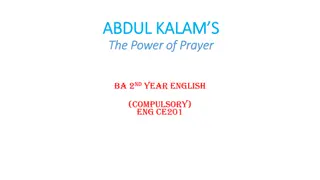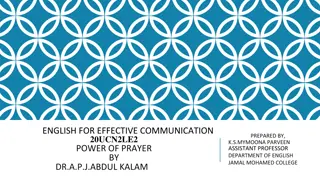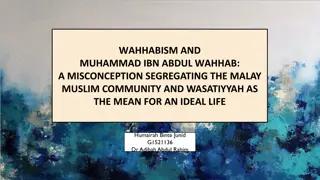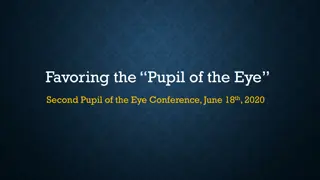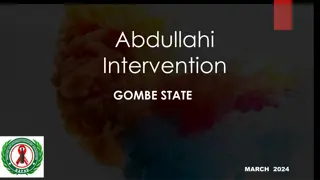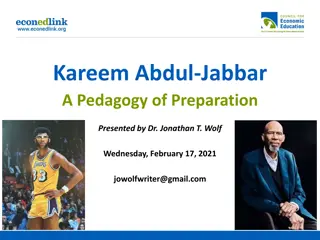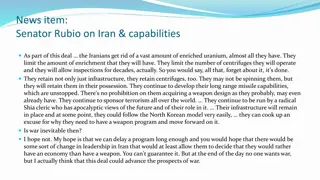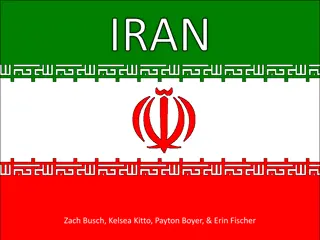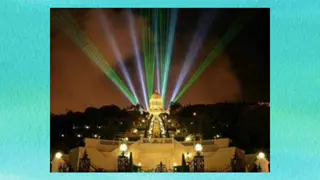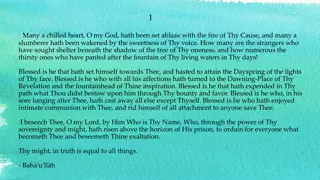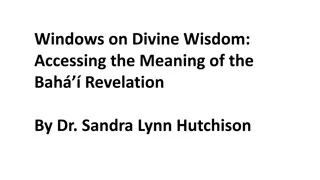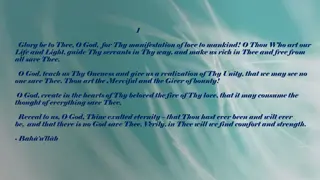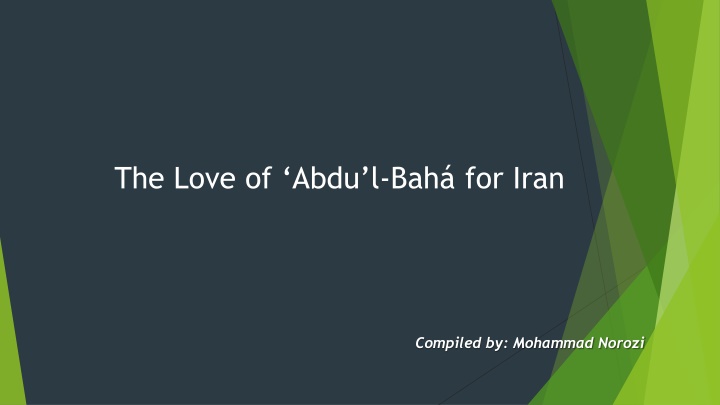
Abdul-Bah's Eternal Love for Iran Expressed Through Nature
Discover Abdul-Bah's deep love for Iran as he beautifully describes the country's essence and transformation through poetic analogies of nature, reflecting his unwavering attachment to his homeland.
Download Presentation

Please find below an Image/Link to download the presentation.
The content on the website is provided AS IS for your information and personal use only. It may not be sold, licensed, or shared on other websites without obtaining consent from the author. If you encounter any issues during the download, it is possible that the publisher has removed the file from their server.
You are allowed to download the files provided on this website for personal or commercial use, subject to the condition that they are used lawfully. All files are the property of their respective owners.
The content on the website is provided AS IS for your information and personal use only. It may not be sold, licensed, or shared on other websites without obtaining consent from the author.
E N D
Presentation Transcript
The Love of Abdul-Bah for Iran Compiled by: Mohammad Norozi
Abdul-Bah was only as a boy of seven when He ceased to have a life in His homeland, Iran, and faced the injustice cruelties. His Father was confined to the S y h-Ch l of N iri d-D n Sh h, and He Himself suffered intense hardship in order to secure the bare necessities of life. Eventually, at the age of eight, He was forced to leave His homeland, accompanied by His family and a number of other B b s, through the snow-covered mountain passes of Asad b d in Hamad n during an unbearably cold winter without the proper clothing to provide sufficient warmth.
Abdul-Bah was Iranian; He remained Iranian, He loved Iran. Negligence of the state of His homeland had no place for Him. He wrote and said many things about Iran. He once said, Although I left Iran sixty years ago, I am still not content to renounce even the smallest of Iranian customs. The Bah s adore Iran. They do not just speak idly! 1 He speaks of His loving attachment to His homeland and in a prayer that illustrates His native Iran, He writes of its natural landscape with the utmost enthusiasm and captivation:
O sanctified God! From the beginning, Thou didst make the earth of Iran to be fragrant with musk; her soil Thou hast caused to stir all things, yielding forth great knowledge and gleaming pearls. From her East hath Thy sun ever shed its splendor, and in her West could the shining moon always be readily discerned. Her land reareth with love, and her celestially tranquil fields are filled with invigorating flowers and foliage. Her hills are bedecked with fresh and luscious fruit, and her meadows rouse even the garden of Paradise to jealousy. Her wisdom stemmeth from her heavenly message and supernal summons, and she surgeth with the force of a billowing, fathomless ocean. 2 1: Passage from a Tablet of Abdu l-Bah , published in M idiy-i- sm n , vol. 5, p. 45. Provisional rendering by Adib Masoumian and Naeem Nabiliakbar. 2: Passage from a prayer of Abdu l-Bah , published in Mak t b-i- a rat-i- Abdu l-Bah , vol. 2, p. 82. Provisional rendering by by Adib Masoumian and Naeem Nabiliakbar.
Through the analogy of nature, Abdul-Bah speaks of changes unfolding in Iran and its decline. Here, He speaks of the illumination of that inner/trueIran . . . . the fresh springtime arrived, and the soul-stirring winds were wafted; the clouds let loose their copious rain, and the light of that nurturing Sun shone forth. The country was stirred; the heap of dust was changed into a bed of roses, and soil once barren became the envy of every garden. The world was made anew, and the fame of Iran spread far and wide. Her mountainous plains grew lush and verdant, and the birds of the meadows warbled their melodies. 3 3: Abdu l-Bah , Mak t b, vol. 2, pp. 82 83. Provisional rendering by Adib Masoumian and Naeem Nabiliakbar.
Abdul-Bah travelled to America when He was seventy, He spoke with His friends about His love of Iran, lamenting the ruin into which it had fallen and the lowest state into which its people had sunk. He during that same journey in America, and through His presence at scientific, cultural, and religious gatherings gained a reputation as aPersian wishing to elevate the name of Iran. His love of Iran was such that His grandson Shoghi Effendi, who had never visited Iran, not only to wish to see Iran, but to make pilgrimage to it as a holy land, as he himself wrote: My highest aspiration, my heart s most ardent desire, is to make pilgrimage to that repository of light . . . to have the honour of treading the radiant soil, and traversing the hallowed valleys, mountains, and hills of that most exalted clime; to inhale the sweet savors of holiness wafting from that land; and to drink the living waters from the rivers that flow in those regions. 4 4: Passage from a letter of Shoghi Effendi, published in Tawq t-i-Mub rakih (1922 1926), p. 72. Provisional rendering by Adib Masoumian and Naeem Nabiliakbar.
However, it should be noted that, Abdul-Bahs loving bond to His homeland of Iran is, in His view, a particular matter, not a universal one. There is always the possibility of conflict between the particular and the universal. Abdu l-Bah always argued against this particularistic element. In a talk given in Paris on 21 October 1911, close before World War I, He says: We wish for love among humanity to come about. Love requires connections. In one case, connections may be familial; in another, the means of love may be national connections; and in yet another, the means of love may consist in a single language . . . all these means are particular. Universal love will not come about [through them]. Love among the inhabitants of the same country may be effected, but the denizens of other nations will be deprived thereof . . . These connections will not result in universal love . . . inasmuch as those connections are material, and material connections are limited. 5 5: Passage from a talk given by Abdu l-Bah at the home of Mr. and Mrs. Scott, published in Khi b t-i- a rat-i- Abdu l-Bah , vol. 1, p. 65. Provisional rendering by Adib Masoumian and Naeem Nabiliakbar.
Continuing His talk, He explains how we can access and manifest the spiritual capacities that lie latent within us: The greatest means for the unification of humanity is spiritual power, for it is not limited by any constraint. It is religion that can bring about the unity of all who dwell on earth. It is the act of turning to God that conduces to the oneness of the world. What is meant by religion, however, is not the blind imitations that prevail among mankind today. These are the cause of enmity and hatred; they lead to war and strife. 6 6: Abdu l-Bah , Khi b t, vol. 1, p. 66. Provisional rendering by Adib Masoumian and Naeem Nabiliakbar.

